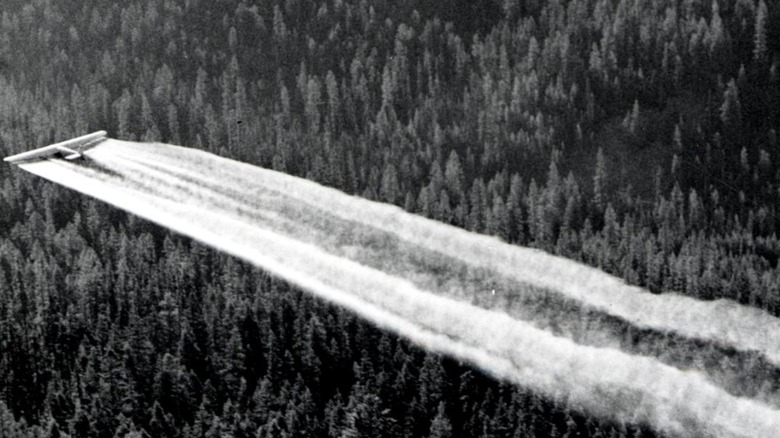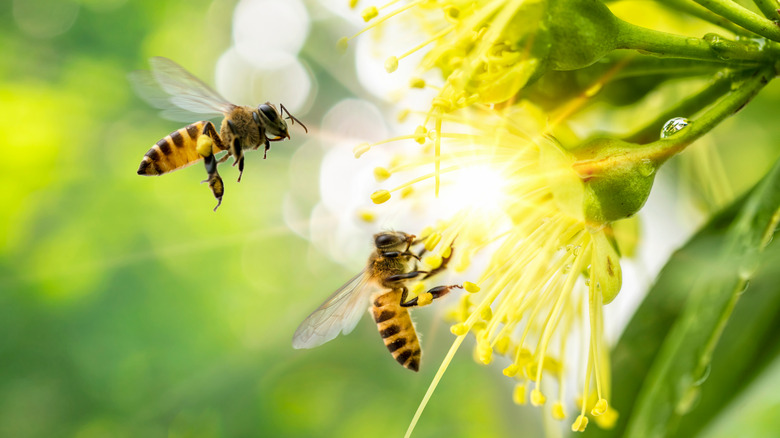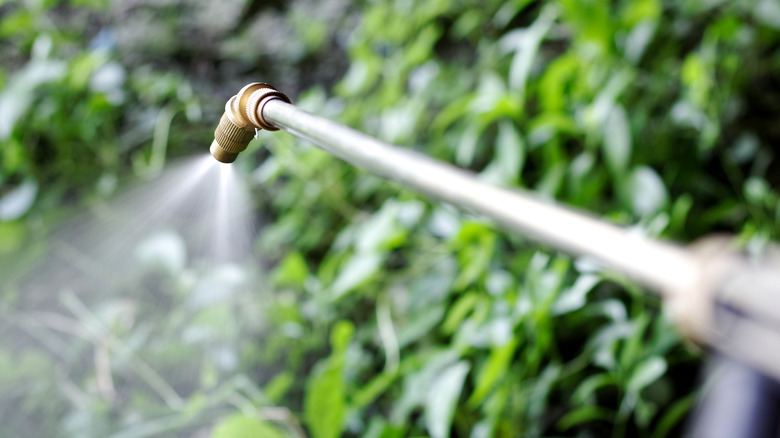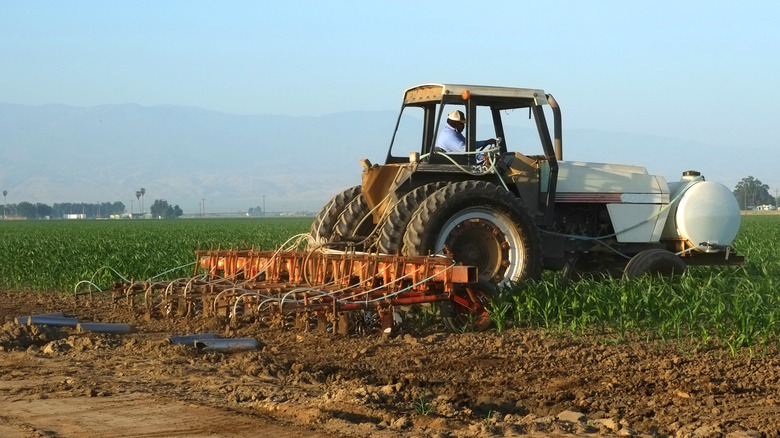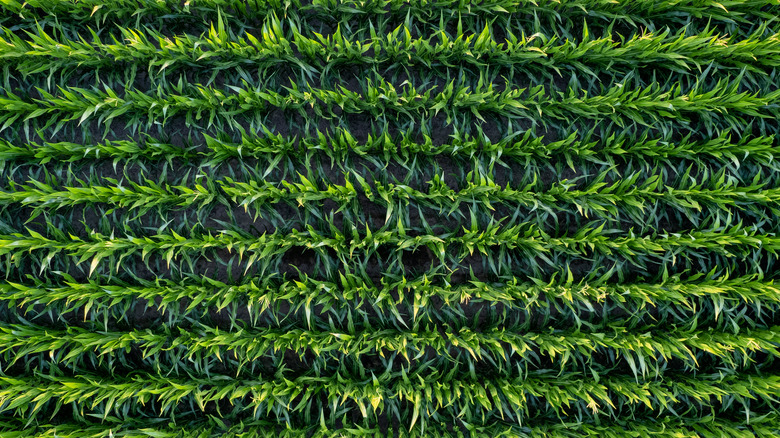Banned Pesticides That Are Still Used In The U.S.
It was a U.S. citizen who first alerted the world to the dangers of pesticides. In 1962, the Pennsylvania-born Rachel Carson published "Silent Spring," a book which illuminated how DDT and other chemical pesticides were harming the environment, according to the Rachel Carson website. Carson spent four years researching the book, which explained how DDT built up in the fat of animals, including humans, and caused cancer and other ailments, according to the Natural Resources Defense Council. The book opened with a description of an imagined town that suffered all at once the various calamities that DDT had been documented to cause in different places: People died from mysterious illnesses, the birds trembled and refused to sing, the rivers emptied of fish, and no bees pollinated the apple trees. "No witchcraft, no enemy action had snuffed out life in this stricken world," Carson wrote. "The people had done it themselves" (via The New Yorker).
The book had a major influence on the worldwide understanding of pesticides and the broader impact of technological progress on the natural world. President John F. Kennedy ordered the President's Science Advisory Committee to investigate Carson's claims, and the committee concluded she was correct. DDT was finally banned in the U.S. in 1972, according to the Environmental Protection Agency (E.P.A.). However, in many ways the U.S. has now abandoned Carson's legacy. It still permits the use of several harmful pesticides that have been banned abroad.
Neonicotinoids
Neonicotinoids are a type of pesticide that, as their name suggests, are chemically similar to nicotine, according to the European Commission. They are also a systemic pesticide, which means they aren't just applied to one part of the plant, like the leaf. Instead, they are absorbed by the entire plant and are present in every part of it, including its nectar. Because of this, neonicotinoids can harm bees and other pollinators, according to the Xerces Society for Invertebrate Conservation. A pair of 2017 studies, for example, found that neonicotinoids present at environmentally realistic levels kill bees over time and make it harder for them to reproduce, as NPR reported.
Out of concern for bees, the EU decided to ban three common neonicotinoids on pollinator-friendly crops in 2013, according to the European Commission. Further research prompted the EU to ban the outdoor use of the pesticides entirely in 2018. The three pesticides — clothianidin, imidacloprid, and thiamethoxam — are still in use in the U.S., according to the E.P.A. The agency proposed interim measures to protect pollinators in 2020, such as limiting when the chemicals can be applied to flowering plants, but did not call for a full ban.
Paraquat
Paraquat dichloride, or paraquat, is an herbicide so toxic that a single sip can kill you, according to the E.P.A. It also gained infamy when it was used to kill marijuana fields in Latin America in the 1970s, according to Reuters. Some studies have also linked paraquat exposure to the development of Parkinson's disease, according to Cell Death & Differentiation. One study found that farmworkers exposed to paraquat had twice the Parkinson's risk, according to Beyond Pesticides. However, a 2021 review of reviews on the topic published in NeuroToxicology (posted at Science Direct) concluded, "A consensus exists in the scientific community that the available evidence does not warrant a claim that paraquat causes Parkinson's disease."
Paraquat is banned in more than 30 countries due to health concerns, according to the Pesticide Action Network. Europe's second-highest court banned paraquat in 2007, Reuters reported. China also banned the pesticide in 2012, according to the Pesticide Action Network. In the U.S., however, it is one of the country's most commonly used herbicides, according to the E.P.A. It is not approved for use by homeowners or in residential areas, but is frequently used by professional applicators to control weeds and desiccate crops like cotton.
1,3-D
The pesticide 1,3-Dichloropropene, or 1,3-D, is a type of pesticide referred to as a fumigant, meaning it is applied as a gas, according to Reveal. Farmers use it to sterilize the soil before growing crops. However, it can evaporate and travel away from the fields to surrounding communities. Short-term exposure can cause chest pain and breathing problems, according to the E.P.A. Three people have been known to develop cancer after inhaling the pesticide following a spill, and the E.P.A. lists it as a "probable human carcinogen."
The substance 1, 3-D is banned in the EU both because of its potential human health impacts and because of the risks it poses to groundwater and "birds, mammals, aquatic organisms and other non-target organisms," according to BBC News. However, as of 2017 it was one of the most frequently used pesticides in the U.S., KCET reported. In California, it was the third-most frequently applied pesticide in the state as of 2019, with more than 12 million pounds used each year, according to the Pesticide Action Network.
Atrazine
Atrazine is a common herbicide used to contain grassy or broadleaf weeds, according to the E.P.A. Its primary use is for agricultural crops like corn, sorghum, and sugarcane, but it is also used on lawns and golf courses. It has been linked to numerous health impacts including leukemia, lymphoma, and breast, ovarian, and uterine cancers, according to the International Journal of Ecosystem. It is also an endocrine-disrupting chemical, meaning that it messes with the production of hormones. Because of this, it can cause birth defects and weight loss.
Atrazine was banned in the EU in 2004 because of its potential human health impacts and because it tends to linger in the environment and harm wildlife, according to the European Commission. However, it is the second-most commonly used pesticide in the U.S., according to the Pesticide Action Network. It is also the pesticide most often found in U.S. drinking water, contaminating 89.2%, according to the U.S. Department of Agriculture Pesticide Data Program (via What's On My Food).
Glyphosate
Glyphosate is an herbicide that is the active ingredient in Monsanto's Roundup, which first debuted in 1974, according to U.S. News & World Report. It has been the subject of controversy and thousands of lawsuits in recent years over concerns that it causes a type of cancer called non-Hodgkin's lymphoma. The World Health Organization's cancer agency determined that it was "probably carcinogenic to humans" in 2015. The E.P.A. disagreed, but it also relied on non-peer-reviewed studies commissioned by Monsanto to make this decision, according to Environmental Sciences Europe.
As of 2020, there were bans or planned bans of glyphosate in 10 countries, including Germany, Saudi Arabia, and Vietnam, according to Human Rights Watch. The E.P.A. reaffirmed its stance that the pesticide was safe in 2020. However, Bayer, the company that purchased Monsanto, took its own action in 2021. It announced that it would replace glyphosate as the active ingredient in its Roundup products sold for residential use in the U.S. beginning in 2023. The move came as the company sought to resolve the more than 125,000 lawsuits filed by plaintiffs claiming that Roundup use gave them cancer, according to Chemical & Engineering News. It settled around 75% of the cases for almost $10 billion in 2020, but still faced 30,000 more. "This move is being made exclusively to manage litigation risk and not because of any safety concerns," the company said in a statement.
